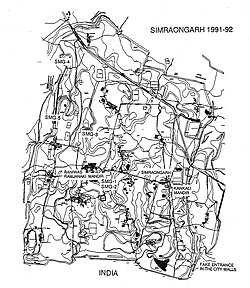| Simraungadh | |
|---|---|
| Native name सिमरौनगढ़ (Hindi) | |
 Location of the medieval city of Simraungadh on the India-Nepal border following archaeological excavations | |
| Founded | 11th century |
| Demolished | 1324 |
Simraungadh, (also referred to as Simramapura, Simraongarh or Simroungarh) (/ˈsiːmraʊnɡɜːr/, Devanagari: सिम्रौनगढ) was a fortified city[1] and the main capital of the Karnats of Mithila,[2] founded by its first ruler, Nanyadeva[3] in 1097.[4][5][6] At the present time, the excavations show that the city is located on the India-Nepal border. There is also a municipality by the same name in Nepal.[7] The archaeological site is currently split between Bara district in Nepal in the north and East Champaran in Bihar, India in the south, both falling within the Mithila cultural region.[8][9]
- ^ Lunden, Staffan (1994). "A Nepalese Labyrinth" (PDF). Caerdroia. 26: 13–21.
- ^ Jha, Makhan (1982). Civilizational Regions of Mithila & Mahakoshal. Capital Publishing House.
- ^ Sinha, Chandreshwar Prasad Narayan (1979). Mithila Under the Karnatas, C. 1097-1325 A.D. Janaki Prakashan.
- ^ Chaudhary, Radhakrishna. Mithilak Itihas [मिथिलाक इतिहास] (in Hindi). Ram Vilas Sahu. pp. 70–112. ISBN 9789380538280.
- ^ Cimino Maria, Rosa (August 1986). "Simraongarh The forgotten city and its art" (PDF). Contribution to Nepalese Studies. 13 (3): 277–288. Retrieved 3 February 2019.
- ^ Garbini, Riccardo (October–November 1993). "A Fragmentary Inscription From Simraongarh, The Ancient Mithila Capital" (PDF). Ancient Nepal (135): 1–9. Retrieved 3 February 2019.
- ^ Vidale, M; Lugli, F (1992). "Archaeological Investigation at Simraongarh" (PDF). Ancient Nepal: 2. Retrieved 6 August 2020.
- ^ Jha, Pankaj (2019). A Political History of Literature: Vidyapati and the Fifteenth Century. Oxford University Press. p. 27. doi:10.1093/oso/9780199489558.001.0001. ISBN 9780199489558.
- ^ Vidale, M.; Balista, C.; Torrieri, V. (October–November 1993). "A Test Trench Through the Fortifications of Simraongarh" (PDF). Ancient Nepal (135): 10–21. Retrieved 11 March 2021.